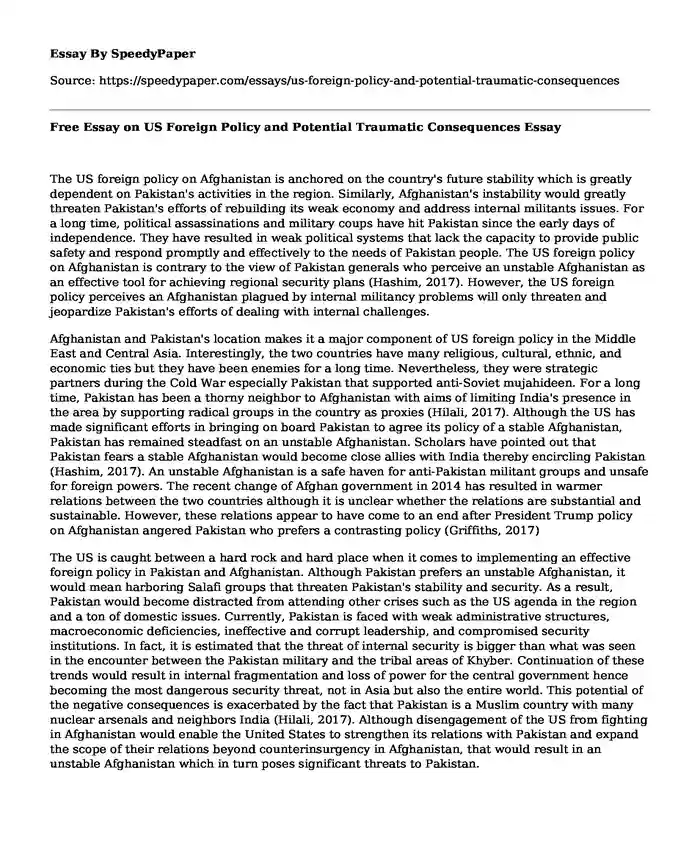
| Type of paper: | Essay |
| Categories: | Foreign policy |
| Pages: | 3 |
| Wordcount: | 616 words |
The US foreign policy on Afghanistan is anchored on the country's future stability which is greatly dependent on Pakistan's activities in the region. Similarly, Afghanistan's instability would greatly threaten Pakistan's efforts of rebuilding its weak economy and address internal militants issues. For a long time, political assassinations and military coups have hit Pakistan since the early days of independence. They have resulted in weak political systems that lack the capacity to provide public safety and respond promptly and effectively to the needs of Pakistan people. The US foreign policy on Afghanistan is contrary to the view of Pakistan generals who perceive an unstable Afghanistan as an effective tool for achieving regional security plans (Hashim, 2017). However, the US foreign policy perceives an Afghanistan plagued by internal militancy problems will only threaten and jeopardize Pakistan's efforts of dealing with internal challenges.
Afghanistan and Pakistan's location makes it a major component of US foreign policy in the Middle East and Central Asia. Interestingly, the two countries have many religious, cultural, ethnic, and economic ties but they have been enemies for a long time. Nevertheless, they were strategic partners during the Cold War especially Pakistan that supported anti-Soviet mujahideen. For a long time, Pakistan has been a thorny neighbor to Afghanistan with aims of limiting India's presence in the area by supporting radical groups in the country as proxies (Hilali, 2017). Although the US has made significant efforts in bringing on board Pakistan to agree its policy of a stable Afghanistan, Pakistan has remained steadfast on an unstable Afghanistan. Scholars have pointed out that Pakistan fears a stable Afghanistan would become close allies with India thereby encircling Pakistan (Hashim, 2017). An unstable Afghanistan is a safe haven for anti-Pakistan militant groups and unsafe for foreign powers. The recent change of Afghan government in 2014 has resulted in warmer relations between the two countries although it is unclear whether the relations are substantial and sustainable. However, these relations appear to have come to an end after President Trump policy on Afghanistan angered Pakistan who prefers a contrasting policy (Griffiths, 2017)
The US is caught between a hard rock and hard place when it comes to implementing an effective foreign policy in Pakistan and Afghanistan. Although Pakistan prefers an unstable Afghanistan, it would mean harboring Salafi groups that threaten Pakistan's stability and security. As a result, Pakistan would become distracted from attending other crises such as the US agenda in the region and a ton of domestic issues. Currently, Pakistan is faced with weak administrative structures, macroeconomic deficiencies, ineffective and corrupt leadership, and compromised security institutions. In fact, it is estimated that the threat of internal security is bigger than what was seen in the encounter between the Pakistan military and the tribal areas of Khyber. Continuation of these trends would result in internal fragmentation and loss of power for the central government hence becoming the most dangerous security threat, not in Asia but also the entire world. This potential of the negative consequences is exacerbated by the fact that Pakistan is a Muslim country with many nuclear arsenals and neighbors India (Hilali, 2017). Although disengagement of the US from fighting in Afghanistan would enable the United States to strengthen its relations with Pakistan and expand the scope of their relations beyond counterinsurgency in Afghanistan, that would result in an unstable Afghanistan which in turn poses significant threats to Pakistan.
References
Griffiths, J. (2017). Who are the key players in Afghanistan?. CNN. Retrieved 25 February 2018, from https://edition.cnn.com/2017/08/26/asia/afghanistan-Pakistan-India-China-Russia-us/index.html
Hashim, A. (2017). Pakistan in the crosshairs of Trump's Afghan strategy. Aljazeera.com. Retrieved 25 February 2018, from http://www.aljazeera.com/news/2017/08/pakistan-crosshairs-trump-afghan-strategy-170824052758366.html
Hilali, A. Z. (2017). US-Pakistan relationship: Soviet invasion of Afghanistan. Taylor & Francis.
Cite this page
Free Essay on US Foreign Policy and Potential Traumatic Consequences. (2022, Feb 10). Retrieved from https://speedypaper.net/essays/us-foreign-policy-and-potential-traumatic-consequences
Request Removal
If you are the original author of this essay and no longer wish to have it published on the SpeedyPaper website, please click below to request its removal:
- Free Essay on South Africa Economy
- Mandatory Vaccination Essay Sample
- Essay Sample with the Poem Analysis
- Free Essay Example on Blood Transfusions
- The Woman in White - Free Essay on Close Reading of a Chapter
- Free Essay: Desperation in Infant Sorrow by William Blake and Sympathy by Paul Laurence Dunbar
- Essay Example on The First Emperor of the Qin Dynasty Book
Popular categories




